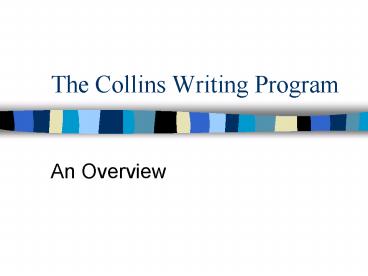The Collins Writing Program - PowerPoint PPT Presentation
1 / 15
Title:
The Collins Writing Program
Description:
They establish clear criteria that enables students to know ... Do not overemphasize mechanical FCAs. Essential FCAs. End Marks. Transitional Words & Phrases ... – PowerPoint PPT presentation
Number of Views:168
Avg rating:3.0/5.0
Title: The Collins Writing Program
1
The Collins Writing Program
- An Overview
2
The Program Consists of Four Elements
- Classroom Management System (Folders)
- Oral Reading
- Focus Correction
- Using Past Papers to Teach New Skills
3
The Five Types of Writing
- They provide students with opportunities to
think on paper - They establish clear criteria that enables
students to know what is expected of them - Each has a different purpose but they hold
several things in common - Type One is Brainstorming (one draft)
- Type Two is Assessment (one draft)
- Type Three is Skill Development (one draft)
- Type Four starts as a type three and adds peer
editing and a second draft - Type Five is Perfect/Publishable (multiple drafts)
4
Type One Writing
Informal writing with the emphasis on generating
ideas, exploring, and recalling rather than on
right or wrong answers. Characteristics
5
Purpose of Type One Writing
- Activating prior knowledge
- Reflecting
- Brainstorming
- Predicting
- Making connections
- Creative Thinking
6
Type Two Writing
Shows that the writer knows something about the
topic. There is a correct or acceptable answer to
a teachers prompt. Characteristics
7
Purpose of Type Two Writing
For checking students understanding
8
Type Three Writing
- Formal (not a Quick-write)
- Has substantive content
- Meets up to three specific standards, Focus
Correction Areas - The draft is read out loud to improve writing
- Self Edited The revising and editing are done
right on the first draft - Always skip lines
9
Oral Reading and Editing
- Improves Reading ability
- Improves the quality of the writing
- Procedure
- Create a draft, read it out loud to answer these
questions - Does it sound right?
- Is it easy to read?
- Did I achieve my goals?
- Have I carefully checked my focus correction
areas?
10
Focus Correction Areas
- A focused, strategic approach that asks students
to pay special attention a few critical aspects
of a given writing project. They are always
accompanied by focused teaching. - Focused Correction Areas (FCAs) concentrate on
one, two or three critical areas of writing or
thinking skills. - FCAs will change over time as they add to and
refine student skills. (Choose FCAs for their
pertinence and utility). - Use FCAs enough times for students to gain
proficiency.
11
Guidelines
- The less mature the writer the more specific the
FCAs - FCAs should encourage better writing rather than
simply avoid errors - FCAs should be a mix of style, content,
organization and mechanics. - Do not overemphasize mechanical FCAs
12
Essential FCAs
Elementary Grade
13
Essential FCAs
Middle School
14
Type Four Writing
- The same as Type Three writing with two
additional steps - The paper is read out loud by another student
then critiqued - A second draft of the paper is prepared
- Reinforces the process of drafting, revising,
re-drafting.
- The Teacher Evaluation
- Is done on the re-draft paper
- May only be done on the FCAs which have been
taught - Previously taught FCAs should be evaluated
15
Type Five Writing
- Is of publishable quality and does not have FCAs.
It can be seen by any audience without
explanation or qualification. - As perfect as possible considering the age and
the ability of the writer. - It has been through multiple drafts.
- It is usually a special project a major
undertaking.































